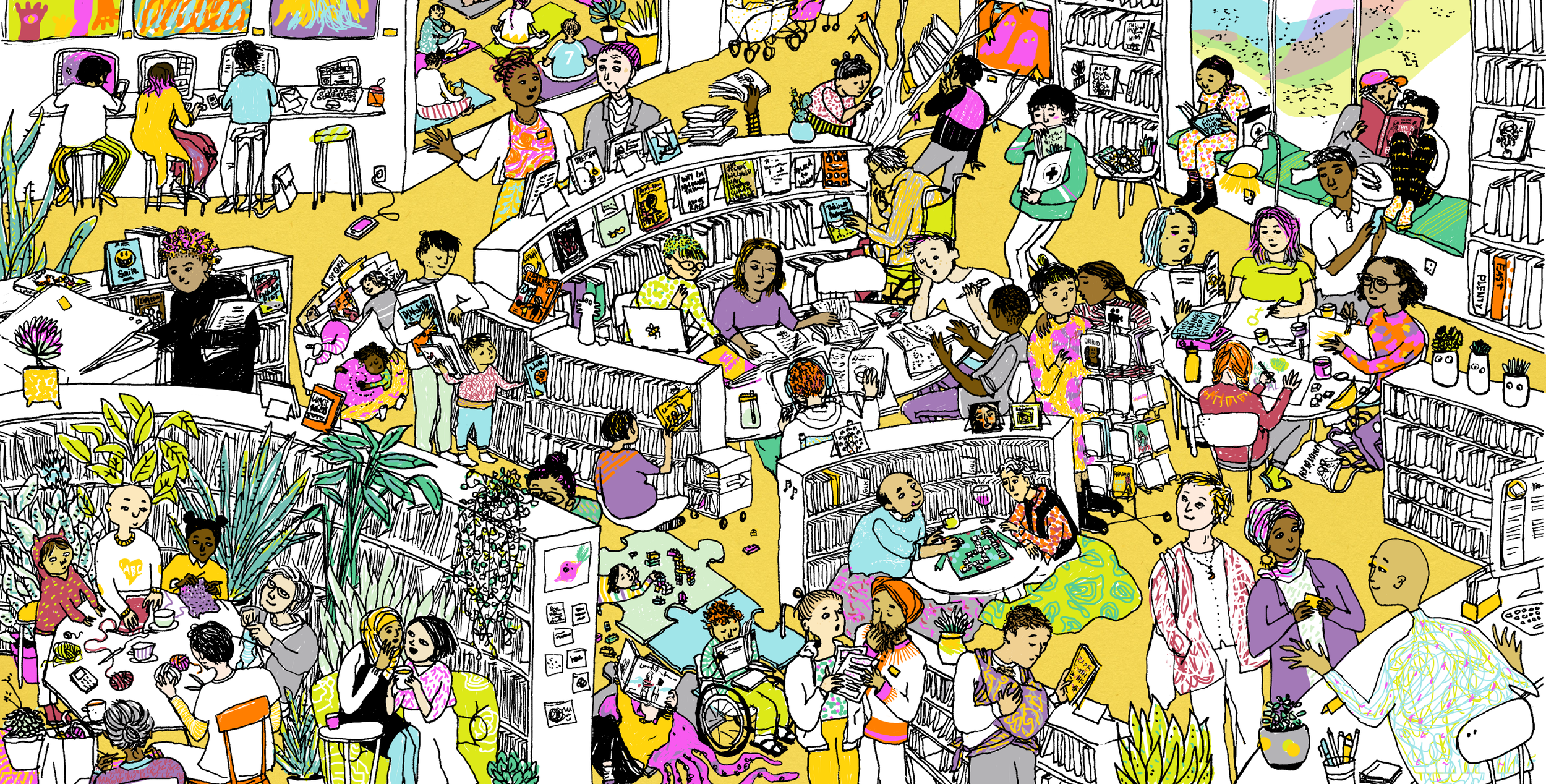What is Living Libraries?
For our first post, we’re talking to Professor Shelley Trower, Principal Investigator on the Living Libraries project (2019-20) and former PI on Memories of Fiction: An Oral History of Readers’ Lives (2014-18).
Hello Shelley. Start us off: what is Living Libraries all about?
At the heart of the Living Libraries project is people talking. It’s a project that uses oral history interviews to explore people’s memories and experiences of public libraries, to find out why and how often people go to them, what people do in and get from them, what people love and hate about the ways they've changed over the past decade or so.
So it’s about the changing role of libraries in people’s lives, but also hints at libraries having a life of their own—how they’ve developed and adapted in various ways. Quite a few people we talked to describe how very hushed and intimidating their local libraries used to be and how wonderfully lively they are now, for instance. But I think quietness is still worth preserving, and I’m aware that other people we talked to seek out quiet library spaces—whether that’s a room or an area of their library, or avoiding the pre-school singing group on Tuesday mornings.
So how have public libraries been changing?
Well, the project explores changes that many people welcome—including children's activities and book groups, computers and eBooks—but also problematic changes, including the very severe impact of cuts. As other services are also cut, more and more people have come to libraries seeking support far beyond the traditional borrowing of books, such as jobseeking support, counselling, or just somewhere warm to be, with people around.
We’ve focused on libraries as sources of health and wellbeing, as social and community spaces, as trusted information providers (which seems ever more important in this digital age), and on their role in supporting environmental action. Libraries are spaces of discovery, of comfort and safety, of hope.
And really there are just so many ways in which people talk about libraries, and so many ways in which libraries matter to people—so our own outputs are just one path through. These outputs include a policy pack, audio clips, creative sound pieces, an audio documentary which will all be available on this website, and we will also be making the interviews available online as a permanent reference resource through National Life Stories at the British Library.
How did the Living Libraries project come about?
Living Libraries developed out of a previous project, Memories of Fiction: An Oral History of Readers' Lives. About five years ago, we started talking to people in library-based reading groups in South London about their memories and experiences of reading. What kept coming across, in addition to the focus on reading, was the importance of libraries. From childhood onwards, our narrators were describing how libraries not only enriched their lives in everyday ways—as spaces of exploration, of study, of social interaction for example—but how they had also been crucial in times of need. So for example Jane described moving from Jamaica to London as a child and being “saved by Roehampton library” where she spent a great deal of time reading.
Over the course of that project I fell in love with libraries. Sarah and I started thinking about a follow-on project, which is what turned into Living Libraries. We went on to interview people beyond London, stretching to Falmouth Library, Peterborough Central Library, Newcastle City Library and Storyhouse, in Chester, as well as Colliers Wood Library in South West London. In total, through both projects, and with Amy Tooth Murphy (who carried out most of the interviews for Memories of Fiction), and our two volunteers, Bryan Tully and Clara Cook, we’ve carried out over 100 interviews about peoples’ experiences of reading and libraries, and the resulting oral histories illuminate a wonderful array of ways in which libraries enrich people’s lives.
And are you a library user yourself?
I don't remember going to libraries of any kind as a child, but after leaving school I do remember using our local library from time to time, to support me taking an A level at night classes, to find out more about things that fascinated or disturbed me, and more recently, after I had children, somewhere to take them on long rainy days (including when I’d managed to lock us out of our flat…). So I was keen enough on public libraries from my own experiences, but when I started talking to people I began to realise just how valuable they can be, in so many more ways than I had imagined.
What else have you learned through Living Libraries?
People depend on libraries for internet access, for safety, and for social connection among many other things, but libraries also enable people to change their lives: to study and gain skills and qualifications, to find new directions. Even when we don't use our library for a while, just knowing it is there can give us a sense of security and possibility: I know I could go there if I needed to (at least once the pandemic situation allows), and it is good to know that there are still precious spaces beyond the commercial world, where you don't need money and where everyone is welcome.
Thank you very much, Shelley.
We hope you’ll take some time to explore the site—and let us know what you think in the comments below.

